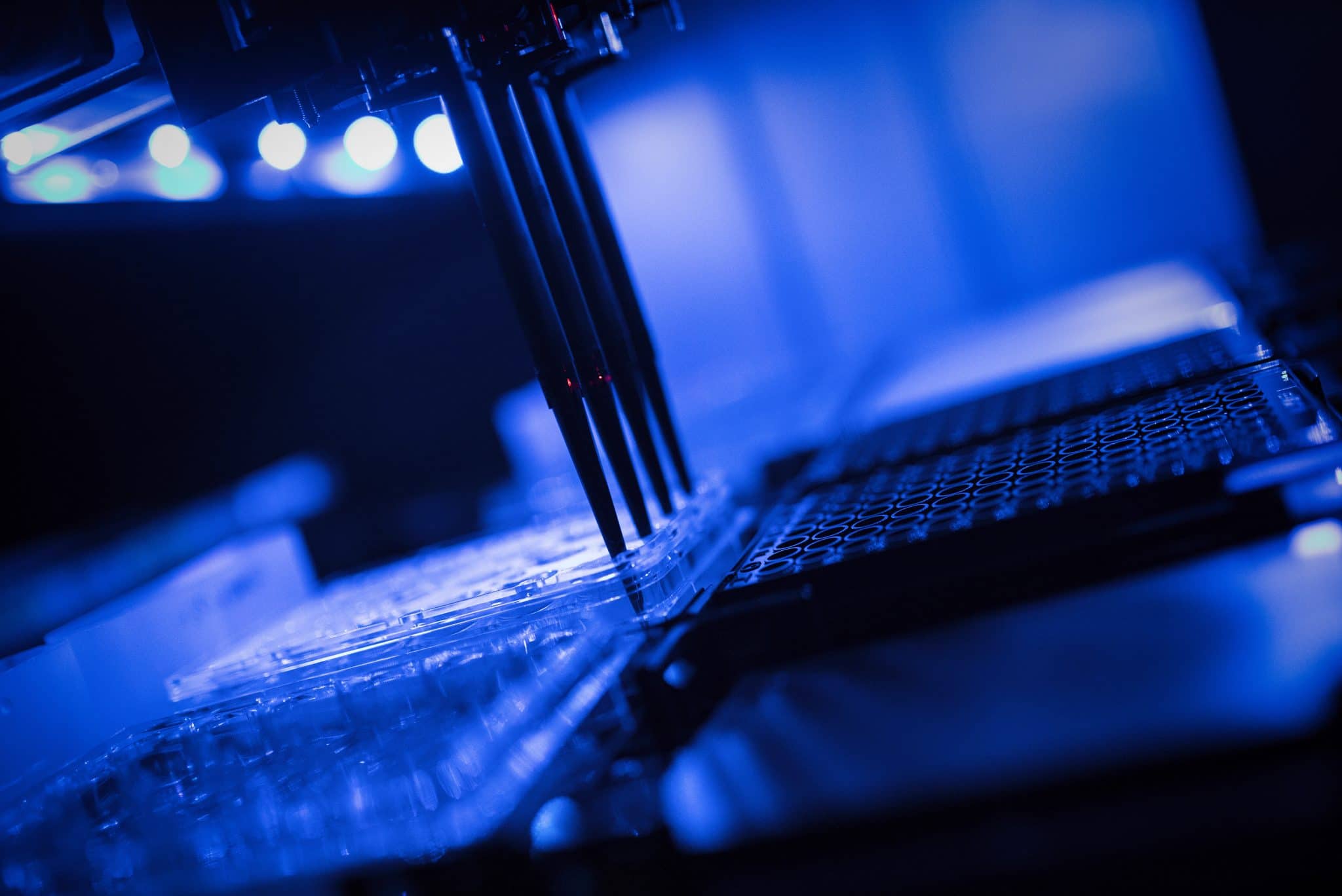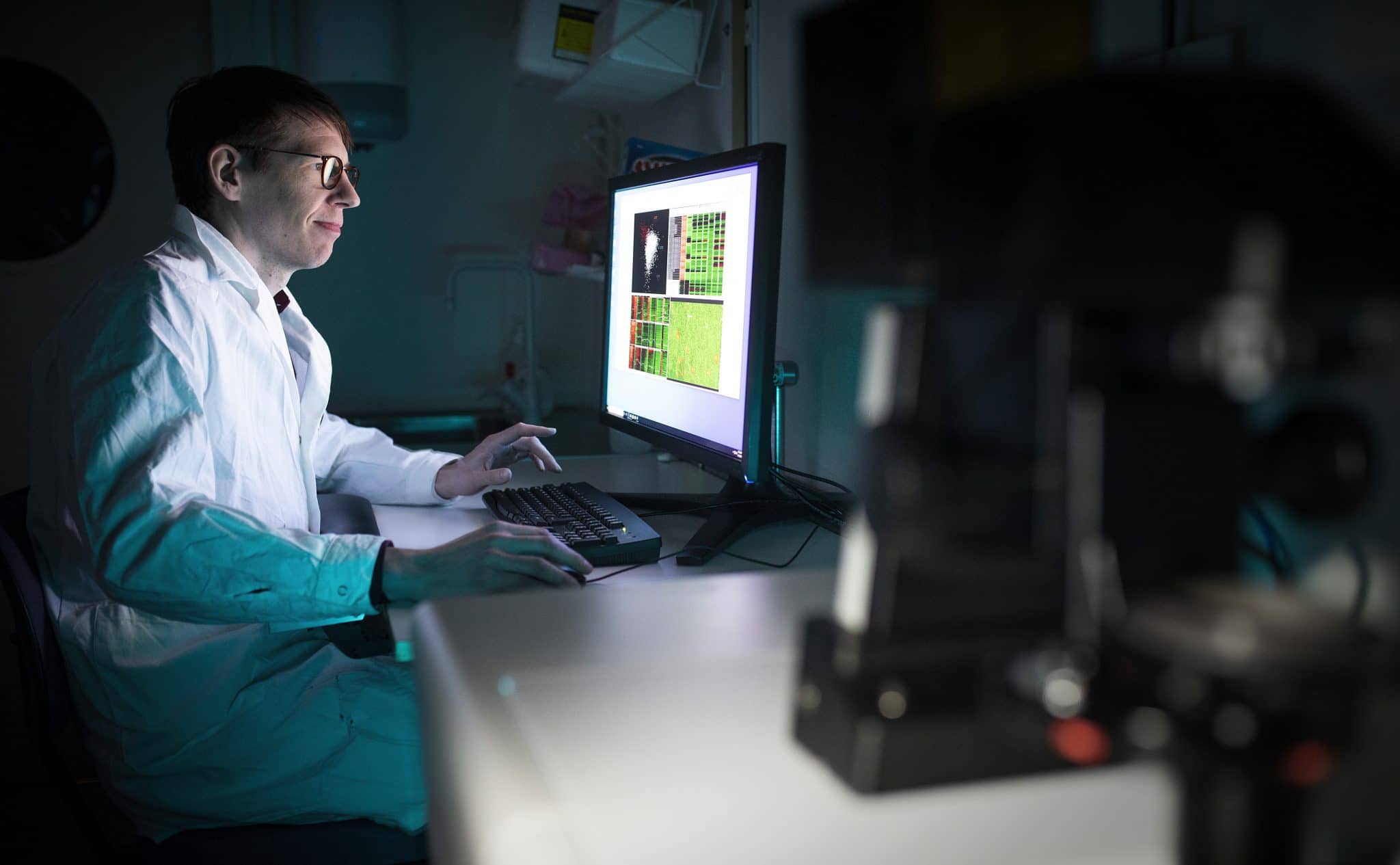SciLifeLab and KAW National COVID-19 Research Program
The purpose of the national program is to provide useful knowledge about the corona pandemic, both now and in the case of future pandemics, to improve preventions, diagnostics and treatments of viral disease, provide a clearer real-time overview of the pandemic, integrate data across technologies and research domains, and create better predictive models.
Program Directors:
Olli Kallioniemi, Karolinska Institutet
Mia Phillipson, Uppsala University
(also members of SciLifeLab Management Group)
Program Coordinators:
Alice Sollazzo, Program coordinator
Maria Bäckström, Communications coordinator
Disa L. Hammarlöf, Research coordinator
(also members of SciLifeLab Operations Office)
Funding source: Knut and Alice Wallenberg Foundation

Phase II of the program
With support from KAW, the SciLifeLab and KAW National COVID-19 Research Program has been extended until 2022. We welcome input and ideas from the SciLifeLab community on how to best continue the program. Please submit your feedback to:
covid19-calls@scilifelab.se.
67 projects in nine areas
Launched through an open call for proposals, this first phase of the program contains 67 projects within nine research areas, studying COVID-19 at the molecular, cellular, patient, population and environmental level.
To enable synergies, the projects are connected to each other, leverage the SciLifeLab infrastructure, and contribute to open data as well as the national COVID-19 data portal. The projects are funded with a total of 50 MSEK from Knut and Alice Wallenberg Foundation. In addition, the SciLifeLab board decided to allocate 12 MSEK of national SciLifeLab funding, for coordinating the program and connecting it with the SciLifeLab infrastructure. A program-specific call was launched in June 2020 for this purpose.
Each research area was appointed a scientific lead, and a coordinator, who promote collaboration and data sharing within the area, and help to form links within the entire program, and to SciLifeLab’s infrastructure, data management support and the COVID-19 program management.
Quick links
National funding to support research area needs
Description of SciLifeLab and KAW National COVID-19 Research Program
Information for Principal Investigators
News articles
National funding to strengthen the collaborative environment of SciLifeLab and KAW’s COVID-19 research program (SciLifeLab News)
Sharing knowledge and setting up collaborations in the next phase of SciLifeLab’s COVID-19 program (SciLifeLab News)
The SciLifeLab and KAW National COVID-19 research program receives an additional MSEK 50 from KAW (SciLifeLab News)
Combating COVID-19 Webinar: The story so far and the future of COVID-19 research (SciLifeLab News)
Research areas
Background
In March 2020, SciLifeLab launched a national call for researchers nationwide, to create a comprehensive program to combat the coronavirus pandemic. A total of 285 proposals were submitted, with applicants ranging from several Swedish universities and hospitals, and other organizations both in Sweden and abroad. The SciLifeLab management group and experts in the field reviewed all proposals and approved 67 for funding.
The projects was funded with a total of 50 MSEK from Knut and Alice Wallenberg Foundation. Furthermore, the SciLifeLab board allocated 12 MSEK for coordination of the program and connecting it with the SciLifeLab infrastructure, to further strengthen the effects of the initiative.
Besides scientific impact, the evaluation criteria considered were relevance and impact on tackling the COVID-19 pandemic, opportunities created by the SciLifeLab community, possibility to form synergies and collaborations, commitment to open data and real-time updates of progress.

Proportions of each research area.
National funding to support research area needs
To further promote a strong and collaborative research environment within the COVID-19 program, and ensure that the participants have the resources required to conduct their COVID-19 related research at full speed, a program-specific call was launched in June 2020. The focus of the call was infrastructure needs, and conditions that need to be met in order to form capabilities between research areas and SciLifeLab units.
The call mainly addressed the most urgent and critical needs, to get the projects up-and-running. Need inventories were formulated by scientific leads, coordinators and PIs representing five of the nine research areas, and after a review by the program management and SciLifeLab Infrastructure Director, national funding was decided to support the following needs:
- Biobanks for COVID-19 research
Support for coordination and biobanking - High-throughput and high-content serology
Support for data analysis and logistics - Host cell systems biology and targets
Support for BSL3 unit to enable access and services for COVID-19 research - Drug discovery and repurposing of drugs
Support for database build up and compound center support - Environmental virus profiling
Support for infrastructure required to rapidly create a national support function for biobanking of environmental samples for virus monitoring (initially waste water) - Data Centre
Support for data management for the SciLifeLab COVID-19 program
The funding amounted to a total of 4,4 MSEK, of which 1 MSEK was allocated to data management support for the program.
A second call, focused on more long-term infrastructure needs and possible new capabilities, was launched in August, allowing more time for discussions of solutions and possibilities between research areas and SciLifeLab platforms and collaborators. 6.4 MSEK national funding was decided to support:
- Biobanks for COVID-19 research
Support to ensure sample quality and adequate sample collection capabilities - High-throughput and high-content serology
Development of Cross-unit Capability related to epitope mapping - Drug discovery and repurposing of drugs
Maintenance of the chemistry-centric data portal for COVID-19 and development of capabilities in ChemoInformatics and Computational chemistry - Environmental virus profiling
Establishing a national resource dedicated to environmental monitoring of infectious agents, an environmental virus biobank and capability for environmental virus profiling at SciLifeLab - Data Centre
Support for data management for the SciLifeLab COVID-19 program - COVID-19 program sequencing capability
Support of coordination of environmental and COVID-19 samples, and build-up of long-term capability for Environmental virus profiling - Upgrade of SciLifeLab units to biosafety laboratory BSL2 standard

Description of SciLifeLab and KAW National COVID-19 Research Program
This document describes the background of SciLifeLab:s national COVID-19 program. It outlines program milestones, sets the framework for how the research program is structured and how it operates, through connections to the infrastructure, Data Centre and other SciLifeLab functions. Follow-up reports will describe the results of the program.
Information for Principal Investigators
Funding acknowledgement
Funding through the SciLifeLab and KAW National COVID-19 Research Program should be acknowledged as This study was supported by grants to Science for Life Laboratory from the Knut and Alice Wallenberg Foundation (2020.0182).
Project financial reporting
Please find below the deadlines for sending the financial reports and requisition regarding KAW-grants for COVID-19 to Marika Kokk, KTH. For this purpose, please use the KAW-requisition template and enclose documentation for the costs, such as extracts from the general ledger.
All costs regarding 2020 must be submitted by email by 31st of January 2021.
All costs regarding 2021 must be submitted by email by 31st of January 2022.
Please note that costs that have not been reported by the second, final deadline for this project, cannot be reimbursed.